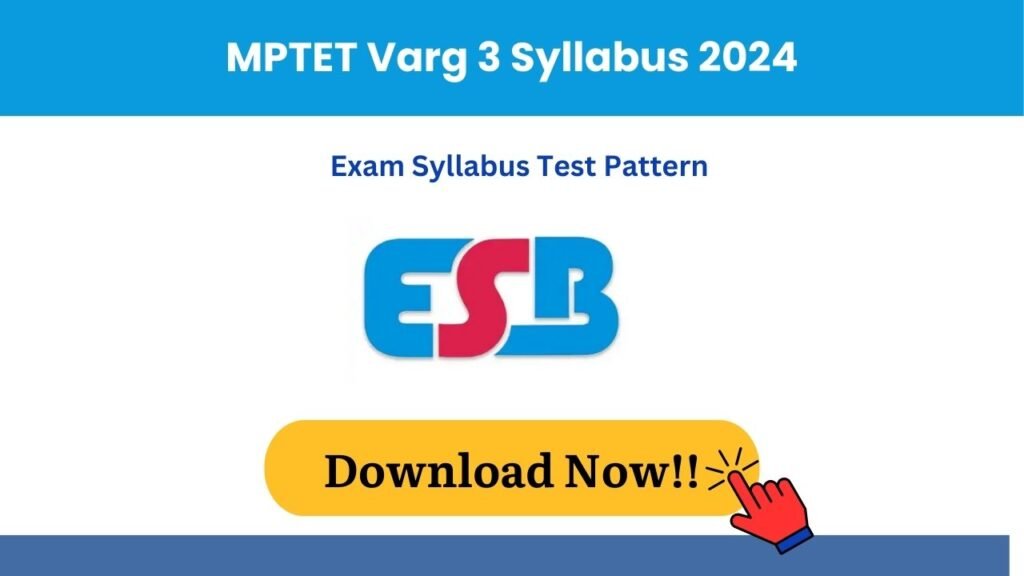Recruitment Overview
The MPESB has made available the detailed syllabus and exam scheme for the PSTET 2024. This official notification, accessible on the MPESB website (esb.mp.gov.in), provides all the necessary information for candidates preparing for the primary school teacher eligibility test. The complete Hindi syllabus can be downloaded in PDF format for convenient study.”
Summary : MPTET Varg 3 Syllabus 2024
| Organizer Name | Madhya Pradesh Employee Selection Board, Bhopal |
|---|---|
| Department Name | School Education & Madhya Pradesh Government, Tribal Affairs Department |
| Test Name | Primary School Teacher Eligibility Test 2024 |
| Class | 1 to 5 |
| Exam Date | Starting from 10th November 2024 |
| Exam Duration | 2 hours 30 minutes |
| Official Website | esb.mp.gov.in |
| Apply Online | MP TET 2024 |
MPTET Varg 3 Syllabus 2024
MPTET Exam Scheme 2024 – Revised Format (Point-Wise)
1. Nature of Exam:
- Type: One paper of 150 marks.
- Duration: 2.5 hours (150 minutes).
- Question Type: Multiple Choice Questions (MCQ) with four options; one correct.
- Negative Marking: No negative marking.
2. Structure and Content:
| Part | Subject | Number of Questions | Marks |
|---|---|---|---|
| (i) | Child Development & Pedagogy | 30 | 30 |
| (ii) | Language-I | 30 | 30 |
| (iii) | Language-II | 30 | 30 |
| (iv) | Mathematics | 30 | 30 |
| (v) | Environmental Studies | 30 | 30 |
| Total | 150 | 150 |
3. Nature and Standard of Questions:
Child Development & Pedagogy:
Based on the educational psychology of teaching and learning for children aged 6-11 years. It will assess understanding of learner needs, characteristics of diverse learners, communication with learners, and attributes of a good facilitator.Language-I:
Questions will test the proficiency in the medium of language chosen by the candidate (Hindi, English, Sanskrit, Urdu, etc.).Language-II:
This will be distinct from Language-I. Candidates will choose from Hindi, English, Sanskrit, or Urdu. It will assess comprehension, communication skills, and understanding of language elements.Mathematics & Environmental Studies:
Questions will focus on subject concepts, problem-solving abilities, and understanding of pedagogy related to the topics.
4. Syllabus (Detailed):
Child Development & Pedagogy (30 Questions):
A. Child Development (15 Questions):
- Concept of child development and its relation to learning.
- Factors affecting development.
- Theories of child development (e.g., Piaget, Thorndike, Pavlov, etc.).
- Heredity and environment’s role.
- Socialization processes: teachers, parents, and peers.
- Intelligence structure and measurement.
- Gender and its social construction, discrimination, and its educational impact.
B. Understanding of Special Needs Children (5 Questions):
- Identification of learners from disadvantaged backgrounds.
- Learning disabilities, special needs, gifted learners.
- Recognition and diagnosis of problem children (juvenile delinquency).
C. Learning and Pedagogical Issues (10 Questions):
- How children think and learn.
- Basic processes of teaching and learning.
- Alternative concepts and errors made by children.
- Motivation, memory, and cognition.
- Learning as a social process.
Hindi Language (30 Questions):
A. Language Comprehension (15 Questions):
- Two unseen passages (one prose, one poetry) for comprehension, grammar, and verbal ability. Passages will focus on various topics like literature, scientific understanding, or social harmony.
B. Pedagogy of Language Development (15 Questions):
- Principles of language learning and teaching.
- Role of listening, speaking, reading, and writing.
- Challenges in language teaching in a diverse classroom.
English Language (30 Questions):
A. Comprehension (15 Questions):
- Two unseen prose passages for comprehension, grammar, and verbal ability.
B. Pedagogy of Language Development (15 Questions):
- Principles of second language teaching.
- Language skills (listening, speaking, reading, writing).
- Challenges in teaching language in a diverse classroom.
Mathematics (30 Questions):
A. Content (15 Questions):
- Number system (numbers above 1000, operations).
- Basic operations (addition, subtraction, multiplication, division).
- Fractions and decimals.
- Measurement (length, weight, volume).
- Geometry (concepts of points, lines, angles, triangles, circles, etc.).
- Patterns in numbers and geometry.
B. Pedagogical Issues (15 Questions):
- Role of mathematics in developing reasoning skills.
- Creating and using teaching aids.
- Evaluation and diagnostic techniques in mathematics teaching.
Environmental Studies (30 Questions):
A. Content (20 Questions):
Family and Friends:
- Care for elderly, sick, and special-needs children.
- Understanding relationships between people, plants, and animals.
Food:
- Nutritional needs, food components.
- Impact of food on health.
Shelter:
- Various types of shelter for animals and humans.
Water:
- Water resources, pollution, and the water cycle.
Travel and Transport:
- Importance of various means of transportation.
Things We Make and Do:
- Conservation of natural resources.
B. Pedagogical Issues (10 Questions):
- Environmental education’s connection to science and social studies.
- Use of teaching aids in environmental studies.
This summary organizes the MPTET exam scheme and syllabus into easy-to-digest points and topics, providing a clear understanding of what to expect in the exam.
www.blasterresult.com
Important Links
- MPTET Syllabus 2024 PDF Download
- MPTET Varg 3 2024
- Download Notification
- Official Website
- Join WhatsApp Channel
- Join Telegram Channel

